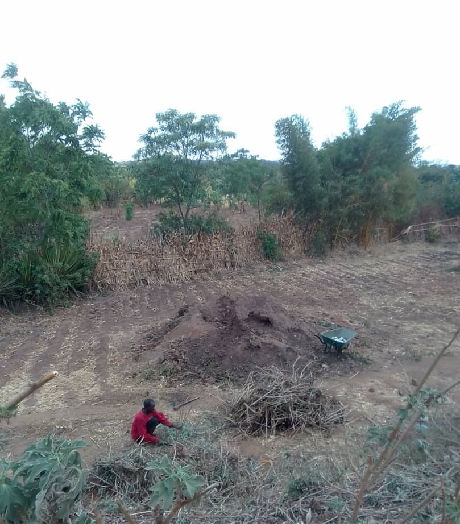By Mabvuto Kalawa, Malawi Freedom Network Correspondent – Nathenje
Rampant deforestation in the Nathenje area has forced communities to rely on maize stalks and other materials such as zingombiro as alternative sources of firewood for cooking. The destruction of trees, caused by uncontrolled cutting, expansion of gardens, and land sales to foreigners, has left most households struggling to find firewood.
As one walks through the villages around Nathenje, it is common to see women and children digging zingombiro along the M1 road or moving from one garden to another, searching for maize stalks to use as fuel for cooking.
During a tour of the area, this reporter interviewed several residents who were busy collecting these materials. Mrs. Anne Chilwa, a resident of Katemera Village, explained that firewood has become scarce and expensive, forcing families to resort to zingombiro and maize stalks.
“Firewood is a big problem here. We have no choice but to use zingombiro because proper firewood is hard to find and too costly,” she said.
Another community member, found digging zingombiro, admitted that the situation is worsening because people have been cutting down trees carelessly without replanting. “We are facing this problem because for many years we have been cutting trees without replacing them,” he said. “Even though there is a forestry officer in the area, he cannot manage to control the situation because the forestry department has limited financial resources. There is also no NGO working here to help with environmental conservation.”
Group Village Headman Kamundi also expressed concern, blaming some community members for selling land carelessly and not protecting trees. “People in this area have themselves to blame. They cut trees carelessly, and when they sell their land, they don’t care about conserving the trees that are on it,” he said. “We have tried to address this problem, but people keep saying the cutting is due to hunger and poverty.”
A forestry officer in the area, who spoke on condition of anonymity, confirmed that deforestation is a major challenge. “Indeed, the rate of deforestation is alarming. However, our office is trying its best to manage the situation despite limited resources,” he said.
The most affected villages include Makokola, Katemera, Satsa, Maye, Namikoko, Chigwedera, and Dilawo — all under Traditional Authority Chadza in Lilongwe District.
This growing environmental crisis demands urgent attention from both government authorities and environmental organizations. Unless alternative energy sources and reforestation initiatives are introduced soon, communities in Nathenje may continue to face worsening hardships.
As Malawians, should we sit back and watch this problem continue to destroy our environment? This is a wake-up call to all responsible authorities to take action and help restore the balance between human needs and environmental sustainability.





This is heartbreaking to read, seeing families have to rely on maize stalks for firewood because of deforestation. I hope there are concrete actions and support to protect Nathenje’s forests and bring safer, sustainable options.